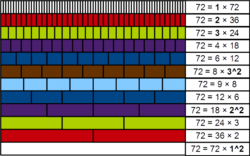Achilles number

An Achilles number is a number that is powerful but not a perfect power.[1] A positive integer n is a powerful number if, for every prime factor p of n, p2 is also a divisor. In other words, every prime factor appears at least squared in the factorization. All Achilles numbers are powerful. However, not all powerful numbers are Achilles numbers: only those that cannot be represented as mk, where m and k are positive integers greater than 1.
Achilles numbers were named by Henry Bottomley after Achilles, a hero of the Trojan War, who was also powerful but imperfect. Strong Achilles numbers are Achilles numbers whose Euler totients are also Achilles numbers; the smallest are 500 and 864.[2]
Sequence of Achilles numbers
A number n = p1a1p2a2…pkak is powerful if min(a1, a2, …, ak) ≥ 2. If in addition gcd(a1, a2, …, ak) = 1 the number is an Achilles number.
The Achilles numbers up to 5000 are:
- 72, 108, 200, 288, 392, 432, 500, 648, 675, 800, 864, 968, 972, 1125, 1152, 1323, 1352, 1372, 1568, 1800, 1944, 2000, 2312, 2592, 2700, 2888, 3087, 3200, 3267, 3456, 3528, 3872, 3888, 4000, 4232, 4500, 4563, 4608, 5000 (sequence A052486 in the OEIS).
The smallest pair of consecutive Achilles numbers is:[3]
- 5425069447 = 73 × 412 × 972
- 5425069448 = 23 × 260412
Examples
As an example, 108 is a powerful number. Its prime factorization is 22 · 33, and thus its prime factors are 2 and 3. Both 22 = 4 and 32 = 9 are divisors of 108. However, 108 cannot be represented as mk, where m and k are positive integers greater than 1, so 108 is an Achilles number.
The integer 360 is not an Achilles number because it is not powerful. One of its prime factors is 5 but 360 is not divisible by 52 = 25.
Finally, 784 is not an Achilles number. It is a powerful number, because not only are 2 and 7 its only prime factors, but also 22 = 4 and 72 = 49 are divisors of it. It is a perfect power:
So it is not an Achilles number.
The integer 500 = 22 × 53 is a strong Achilles number as its Euler totient of 200 = 23 × 52 is also an Achilles number.
References
 |

